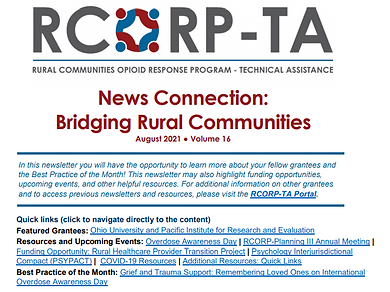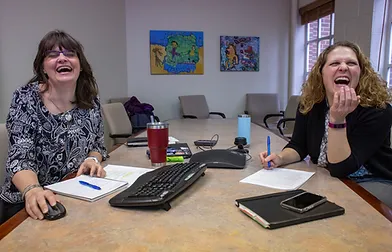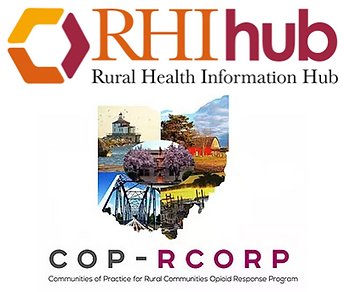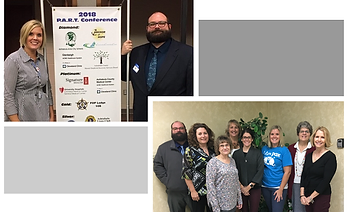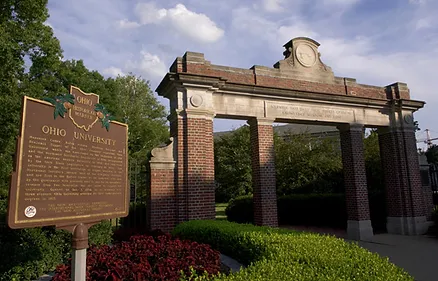In The News
The August issue of the monthly RCORP-TA newsletter entitled “News Connection: Bridging Rural Communities!” highlights COP-RCORP as one of the grantees from across the country.
As COVID-19 continues to spread across the Unites States, mental health and addiction services professionals understand all too well the uncertainty that is taking a toll on people’s mental health. Health care providers in Kentucky recently reported a 20 percent increase in calls to suicide prevention hotlines in their state, and while Ohio hasn’t yet measured a direct impact, its local mental health community is working together feverishly to build an arsenal of tools and resources to help people cope with increased fear and anxiety. Dr. Holly Raffle, Professor of Leadership and Public Affairs, leads the Programmatic Partnership for Community-Based Prevention for Ohio University’s Voinovich School of Leadership and Public Affairs.
The Washington County Behavioral Health Board (WCBHB) has many initiatives including the Fatality Review Board, which collects and analyzes data from the coroner’s office in order to establish baselines and trends for Washington County. Representatives of the Fatality Review Board will review this data with a multi-disciplinary lens, develop a strategic plan and connect with regional, state, and national partners to design and implement prevention and intervention programs around identified needs and high-risk populations.
Laura Milazzo is a Research Associate at Ohio University’s Voinovich School of Leadership and Public Affairs. She conducts a wide variety of evaluation, applied research, and planning projects on health and social service issues. Previously, Laura worked for the Centers for Medicare and Medicaid Services in the U.S. Department of Health and Human Services as a social science research analyst. She holds a Master’s degree in Sociology from the University of Kansas.
The Fremont News Messenger reports that the Sandusky County department announced in December 2018 it received around $35,000 from the HRSA-RCORP grant to be used to combat the opioid problem as a part of the COP-RCORP consortium. The Mental Health and Recovery Services Board of Sandusky, Seneca and Wyandot Counties also has distributed hundreds of thousands of dollars in recent years from the county’s mental health levy to support a variety of programs tied to mental health and fighting the county’s opiate epidemic. Sandusky County’s year-over-year accidental overdose death totals dropped from 23 to 17 in 2018, with the county mirroring a statewide trend in declining drug-related deaths.
This feature in the Rural Health Information Hub highlights the work of COP-RCORP planning grantees in Ohio. The article highlights the presentation of Dr. Courser and Raffle at the National Rural Health Association (NRHA) Annual Rural Health Conference in Atlanta as well as key work in local consortia, including an interview with Washington County project director, Shaeleigh Sprigg.
CADCA recently highlighted Ashtabula County coalition for the supporting the implementation of the PAX Good Behavior Game in county schools. According to Katie Park, Ashtabula County Coalition Coordinator, “On average, the schools that are being monitored by the coalition saw a 52% decrease of unwanted behaviors in the classroom during the first year of implementation.”
Those on the front lines of substance abuse prevention efforts in Ashtabula county were honored September 28th during the Ashtabula County Prevention Coalition Community Champion Recognition Breakfast. Several agencies in the county were recognized for their work in substance abuse prevention efforts, including the Ashtabula County YMCA, Ashtabula County Health Department and the nine public libraries in the county. Those awarded include HRSA COP-RCORP consortium members.
Voinovich School receives grant for Ohio opioid program
Ohio University’s Voinovich School of Leadership and Public Affairs partnered with the Pacific Institute for Research and Evaluation (PIRE) to submit two separate, but complementary, grant proposals from the Health Resources and Services Administration’s (HRSA) Federal Office of Rural Health Policy to help communities in five Ohio counties implement the Rural Communities Opioid Response Program (RCORP). Both were funded for $1 million each. The partnership will enable the organizations to continue to work with communities in Ashtabula, Fairfield, Seneca, Sandusky and Washington counties through a highly innovative community of practice approach that empowers high-risk rural Ohio communities to address opioid use and overdose deaths across the full continuum of care.
As a follow-up implementation grant to an initial $200,000 planning grant, Ohio University’s Voinovich School of Leadership and Public Affairs partnered with the Pacific Institute for Research and Evaluation (PIRE) and each was awarded two separate, but complementary, grant proposals from the Health Resources and Services Administration’s (HRSA) Federal Office of Rural Health Policy to help communities in five Ohio counties implement the Rural Communities Opioid Response Program (RCORP). The grant money will be distributed to five organizations who will lead local consortiums to implement RCORP: the Ashtabula County Mental Health and Recovery Services Board; the Fairfield County Alcohol, Drug Addiction, and Mental Health Services Board; the Sandusky County Public Health Department; the Mental Health and Recovery Services Board of Seneca, Sandusky and Wyandot Counties; and the Washington County Local Health Department.
FREMONT – Ohio University is helping combat the opioid epidemic in Sandusky County thanks to a $200,000 federal grant the school was awarded for innovation on social issues.
Ohio University’s Voinovich School of Leadership and Public Affairs has received a $200,000 grant from the Health Resources and Service Administration (HRSA) in the U.S. Department of Health and Human Services to help communities in the planning phase of the HRSA Rural Communities Opioid Response Program.
The Ashtabula County Mental Health and Recovery Services Board and the Ashtabula County Substance Abuse Leadership Team are working with Community Counseling Center, Glenbeigh, Lake Area Recovery Center, and Signature Health to start a free training academy. The training academy was developed to assist Ashtabula County residents who are interested in becoming a chemical dependency counselor assistant meet the 40 hours of training required for certification by the state of Ohio.
The Mental Health and Recovery Services Board of Seneca, Sandusky and Wyandot counties, Firelands Counseling and Recovery Services and Seneca County Drug Task Force — METRICH Enforcement Unit teamed up back in July 2020 to create a Quick Response Team.









